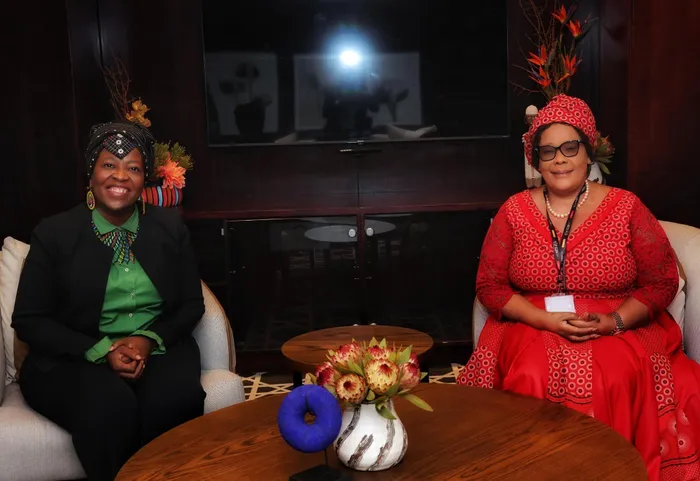G20 Development Working Group focuses on global solidarity and action

Minister in the Presidency for Planning, Monitoring & Evaluation Maropene Ramokgopa and KwaZulu-Natal director-general Dr Nonhlanhla Mkhize during a pre-meeting briefing session ahead of the third G20 Development Working Group Meeting on Sunday.
Image: South African Government
The G20 Development Working Group convened on Sunday with an urgent mission to cultivate solidarity, equality, and sustainability in pursuit of transformative global change. This gathering, set against the backdrop of South Africa’s G20 Presidency, signals a renewed commitment to multilateralism.
The session commenced with a call to action reflecting the current global crossroads.
During her opening address, Minister in the Presidency for Planning, Monitoring & Evaluation, Maropene Ramokgopa, said the global community is at a crossroads.
Ramokgopa said humanity faces significant intertwined global challenges, including extreme poverty, inequality, geopolitical tensions, conflict, insecurity, climate change risks, extreme weather, and economic instability. Despite these complexities, there is potential for transformative progress and the realisation of dignity for all.
“Notwithstanding all of these factors, our collective commitment and capacity as humanity to address and tackle these challenges and exploit the opportunities is key,” Ramokgopa said.
She believes the working group must be a vessel for hope and action, where global ambition meets solutions to global challenges, practical delivery and where solidarity guides their solutions.
Additionally, the working group should reinvigorate multilateralism, strengthen development cooperation, and forge collective solutions that leave no one behind.
Over the next three days, topics will revolve around three priority areas central to the working group’s mission:
- Strengthening Domestic Resource Mobilisation through curbing Illicit Financial Flows, which continue to deprive developing nations of the resources needed to invest in health, education, and infrastructure.
The issue of Illicit Financial Flows remains a critical challenge for many countries, especially in Africa. Estimates indicate Africa loses around $88.6 billion annually due to Illicit Financial Flows.
“South Africa strongly supports the continued engagement of the Financial Action Task Force in identifying gaps and enhancing global cooperation and urges the G20 to adopt an even more development-centred approach to financial integrity, grounded in transparency, fairness, and capacity support,” Ramokgopa said.
2. Advancing Social Protection Systems to provide dignity, resilience, and opportunity for all, particularly the poor, women, youth, and vulnerable groups. Social Protection Systems remain a cornerstone of South Africa’s fight against poverty and inequality.
“As part of our ‘social wage’, we continue to invest in income support, universal healthcare, education, housing, and access to basic services,” Ramokgopa said.
The G20’s High-Level Principles on Social Protection, adopted in 2021, affirm the critical role of social protection in building resilience and promoting inclusive growth. These principles must translate into global best practices and measurable outcomes.
3. Supporting access to Global Public Goods. This is essential for, amongst others, managing climate risks, promoting global health, and fostering digital inclusion.
Ramokgopa said they should ensure that Global Public Goods governance and financing mechanisms are inclusive and just.
South Africa has championed calls for fairer access to clean technologies, vaccines, and climate adaptation finance.
Ramokgopa said she was encouraged to see the working group deepening its coordination with other G20 working groups and workstreams, including Finance, Climate Sustainability, Employment, and Anti-Corruption, to ensure policy coherence and systemic impact.
The G20’s strength lies in its ability to connect development, finance, and global governance, creating crucial linkages that underscore its unique role.
“I wish to welcome the important contributions of partner institutions such as the Development Bank of Southern Africa, the International Labour Organisation, and the Financial Action Task Force in the work of this Group,” Ramokgopa said.
“I am confident that their insights will enhance our work and contribute to the practical tools and partnerships needed to build just, inclusive, and resilient societies.”
Ramokgopa added that the negotiations are about the lives and livelihoods of billions of people worldwide, and the kind of future they collectively wish to shape.
thobeka.ngema@inl.co.za
Related Topics: